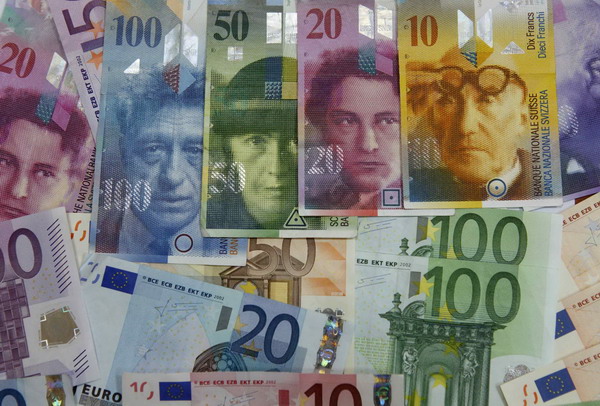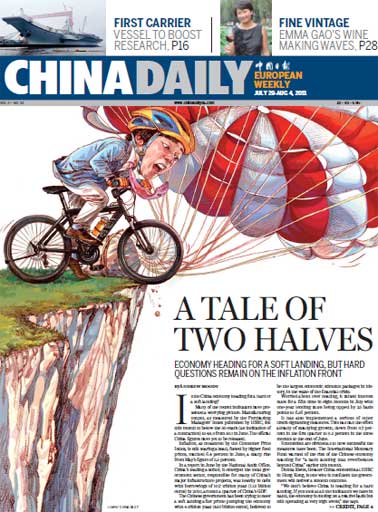Economy
EU urges bailout changes as stocks, euro tumble
Updated: 2011-08-05 10:02
(Agencies)
|
 File illustration picture shows various Euro banknotes laying next to various Swiss Franc notes at a bank in Warsaw, July 18, 2011. [Photo/Agencies]
|
And despite indications that the European Central Bank has restarted its bond buying program after a four-month hiatus in an attempt to calm markets, the financial pressures on Italy and Spain remained acute, sending stock markets across Europe plummeting.
European Commission President Jose Manuel Barroso urged eurozone leaders to make further changes to their bailout fund - including boosting its size - to ensure it can effectively stem the debt crisis that has rocked the currency union for 21 months.
Barroso's appeal and the ECB's apparent turnaround came just two weeks after eurozone leaders reached what they branded a "historic" deal on the currency union's crisis strategy, including a second massive bailout for Greece and far-reaching new powers for their rescue fund.
However, the accord failed to stem rising panic on financial markets over the ability of the eurozone's third and fourth largest economies to repay their debts.
Although the yields, or interest rates, on Italian and Spanish bonds were below records reached earlier in the week - possibly linked to purchases by the ECB - the two countries' stock markets were, like all others in Europe and the US, firmly in the red, while the euro slid against the dollar.
Spain's benchmark stock market index plunged 3.9 percent Thursday, marking its biggest one-day loss this year yet, and Italy's stock market also plummeted, with Milan's FTSE MIB index down by 5.16 percent.
Germany's DAX index of blue chip companies fell by 3.4 percent, and France's CAC 40 lost 3.9 percent.
Investors in the US also dumped stocks amid increasing uncertainty about the economy, with the Dow Jones industrial average about 4.3 percent lower at 11,383 while the broader Standard & Poor's 500 index fell 4.8 percent to 1,200.
The EU's Barroso, meanwhile, said in a letter to eurozone leaders dated August 3 but made public Thursday the main reason behind Spain's and Italy's market woes was "the undisciplined communication and the complexity and incompleteness of the 21st July package."
That, he wrote, has led to "a growing skepticism among investors about the systemic capacity of the euro area to respond to the evolving crisis."
The commission president urged "a rapid reassessment of all elements related to" the eurozone's bailout fund, known as the European Financial Stability Facility, so it can effectively use its new powers. A spokeswoman for Barroso confirmed that those elements included the fund's size.
But getting the eurozone to agree to new measures will not be easy.
"It doesn't seem clear how a reopening of the debate just two weeks after the summit is supposed to help calm markets," said a German government official. "What is important now is to swiftly implement the summit agreements. That's what everyone has to concentrate on and not on reopening questions that were already answered on July 21." The official was speaking on condition of anonymity because of the sensitivity of the crisis debate.
On July 21, eurozone leaders decided to equip their bailout fund with new pre-emptive powers, such as the ability to buy up distressed government bonds to support their prices or extending short-term credit lines to countries before they are in full-blown crisis mode.
That was a recognition that rescue packages like the ones given to Greece, Ireland and Portugal, which keep those countries out of the market for several years, would be far too expensive for Italy and Spain.
However, analysts have said the EFSF won't be able to properly use these new powers at its current size.
Of the euro440 billion ($629 billion) in the fund, euro43.7 billion has been committed to the bailouts if Ireland and Portugal and the costs of helping Greece will take its reserves down to less than euro300 billion - not enough to pre-empt crises in Italy and Spain, analysts warn.
A large-scale intervention in secondary bond markets could easily suck up much of that, considering that the European Central Bank spent almost euro80 billion on cushioning drops in Irish, Portuguese and Greek bonds before those much smaller countries had to be bailed out.
Barroso also urged leaders to speed up the implementation of the previously agreed changes to the fund, which have to be ratified by national governments and in many cases parliaments, which are currently on summer breaks.
At the moment, experts from eurozone countries as well as the ECB and the Commission are still poring over the decisions taken by the leaders, and Barroso's letter indicated that some states may already be pulling back from their commitments.
"These changes should also avoid introducing excessive constraints in terms of either additional conditionality or collateralisation of EFSF lending," Barroso wrote. His spokeswoman declined to say which countries were making demands or give details on the requested conditionalities.
The July 21 deal was vague on the conditions under which the EFSF would be allowed to intervene in the bond markets, saying only it would come with ECB analysis and the approval of all eurozone countries.
The delay in implementing the changes to the fund has left the eurozone without any preventive tools, just as the 21-month debt crisis has boiled up again.
The most recent anxiety over Italy and Spain comes after banks and other private investors on Greek bonds were asked to take some losses as part of the country's second bailout - a move that the eurozone had ruled out for most of the crisis and which analysts warn may well be in the cards for other weak European states.
It also coincides with a broader fear that the US economy, in particular, may be weakening, dealing a further blow to Europe's recovery.
Spanish Prime Minister Jose Luis Rodriguez Zapatero once again delayed the vacation he was supposed to take earlier this week, instead staying in Madrid to monitor the increasingly bleak market developments.
Zapatero ordered his economic team to maintain "permanent contact" with their European counterparts, adding that Spain believes "it is essential that agreements on the bailout for Greece and the reform of the mechanism to support eurozone countries" will be swiftly implemented, according to a statement from his office.
The Spanish Treasury later announced that it canceled a bond auction scheduled for Aug 18, but would launch a new five-year benchmark bond Sept 1.
E-paper

Double vision
Prosperous Hangzhou banks on creative energies to bridge traditional and modern sectors
Minding matters
A touch of glass
No longer going by the book
Specials

Ancient plate broken
An ancient porcelain plate was accidentally destroyed during a research in the Palace Museum.

Selfless actions
A 20-year-old girl becomes an Internet star for giving her first kiss to a drowning old man.

Space race
Homebuyers are learning the hard facts of supply and demand: too many cars and too few parking spaces.
